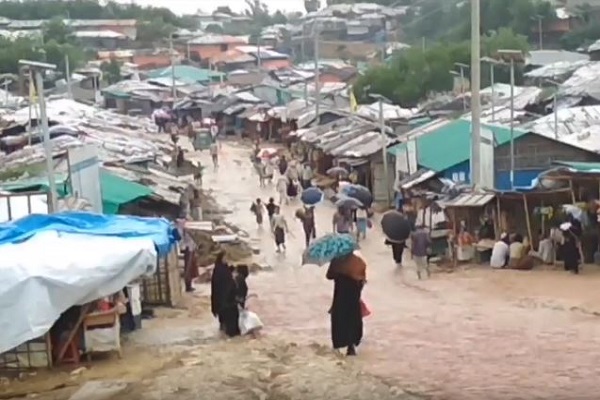
Cardinals Visit a Bangladesh Rohingya Refugee Camp
- By Alison Lesley --
- 02 Aug 2019 --

They also met with a relief agency, government officials and refugee family members
A Rohingya refugee camp in Bangladesh was visited by two cardinals[/tweetit] who hail from Burma and the Philippines. The cardinals met government officials, relief agency personnel as well as refugee families.
Cardinals Visit a Bangladesh Rohingya Refugee Camp[/tweetthis]
Cardinal Luis Antonio Tagle of Manila accompanied Cardinal Charles Maung Bo of Yangon as they made their way to the refugee camps on July 29.
Cardinal Tagle is president of a global confederation of Catholic development and relief agencies known as Caritas Internationalis. The confederation has done plenty of work and has provided sanitation, water, shelter, and living supplies to more than 500,000 Rohingya refugees.
The Federation of Asian Bishops Conferences is headed by its president, Cardinal Bo. The cardinals visited Muhammad Abul Kalam. Kalam is the chief of an organization known as Bangladesh’s Refugee Relief and Repatriation Commission. The organization does a lot of work, including taking care of close to a million refugees in the country. It also manages 30 refugee camps. Kalam explained the obstacle his organization faced in the camps and thanked the cardinals for the Church’s aid for the refugees.
Kalam added that he thinks that the cardinals are now aware of all the different challenges that the refugees face. The cardinals weren’t alone. Bishop Gervas Rozario of Rajshahi and Cardinal Patrick D’Rozario of Dhaka, Bangladesh; Holy Cross Archbishop Moses Costa of Chittagong joined them.
The Rohingya have been through a tragic history. They suffered an increase in state-sponsored violence in Burma in 2017. The Rohingya are a Muslim minority group. The Burmese government will not use the term Rohingya and treats them as illegal immigrants from Bangladesh. A controversial law enacted in 1982 has served to deny the Rohingya citizenship as well as other rights.
The United Nations has called the crisis an example of ethnic cleansing when referring to the violence the Rohingya have endured. The Rohingya have had no choice but to flee. More than a million of them have run across the Burmese border to Bangladesh. They now live in an area which is not part of Bangladesh or Burma. The area they live in acts as a sort of “buffer zone” between the two nations.
The leaders of the Rohingya have refused a 10-member Myanmar government delegation’s offer to return to Myanmar. They have said that they will only accept if they receive citizenship in their own country while being recognized as an ethnic group. They also have demands which they want to be met of justice, international protection, and the ability to be able to return to their original lands and villages.


















